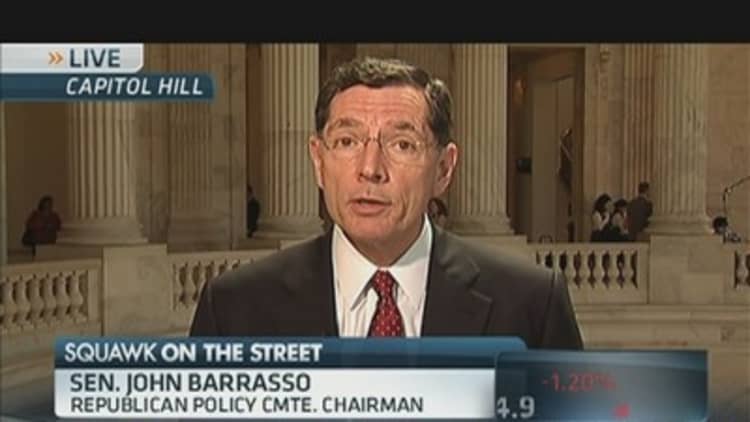For some people, overspending might mean ordering the lobster or splurging on an extra pair of shoes at Macy's.
For Julie Fast it's different. The Portland, Oregon, author woke up one day and decided to go on a trip to China. She obtained a visa, hopped on a flight, enrolled in language school and was conversing in Mandarin within weeks. Along the way, she blew through around $10,000.
Shortly after that, and partly as a result of the impromptu and costly spree, she was diagnosed with bipolar disorder. Wild overspending often goes along with the manic highs that, when interspersed with depressing lows, characterize the disorder, which afflicts roughly 5.7 million Americans.
"When you have manias, that voice of caution is literally taken away. It is gone," says Fast, 49, who co-wrote the book "Take Charge of Bipolar Disorder" and helped advise actress Claire Danes for her role as a federal agent afflicted with bipolar disorder on the popular TV series "Homeland."
One sufferer she knows impulsively spent $40,000 on a piece of art. Another bought an entire mini-mall - the whole building and the shops within it.
"I have known people who have used up their whole 401(k)s, who have gambled it all away, who have taken their kids' college money," she said. At the time, "it feels so good that you don't even worry or feel guilty."
WHEN SPENDING IS A SYMPTOM
Overspending is one of the primary tip-offs that someone is in a manic state, experts say.
"Typically when folks become manic, they get overconfident and lose the ability to evaluate the consequences of their actions," says Dr Jair Soares, chairman of the psychiatry department at the University of Texas Health Science Center at Houston. "In that mind-state, when it comes to spending, they are bound to get into trouble."

Then, of course, there is the crash. In a depressed state, those with bipolar are actually unlikely to spend much money at all, since they are often cocooned at home. But at that point they have to deal with the consequences of their previous overspending.
"If they bought a $10,000 watch, they might try to return it," says Dr Igor Galynker, director of the Family Center for Bipolar at New York City's Beth Israel Medical Center. "Or they might try to hide the purchases, or get that money back by gambling on other investments."
And those morning-after bills and bad feelings don't just flow to the bipolar spender; their families feel the pain too.
BEST DEFENSE A GOOD OFFENSE
Once a mania is in full effect, it is very difficult to rein in. That is why the most powerful way to limit overspending is to recognize the signs of an approaching mania and take action early.
If your bipolar partner starts talking about splurging on extravagant trips or cashing out a 401(k) to fund a new business, it is likely time to apply the brakes. Check to make sure they have been taking their medication, get them to a doctor if possible, and involve any existing support network to help your partner stick to the plan.
"That might involve confiscating their credit cards, taking their car keys for a while, keeping them at home so they don't get into trouble," said Soares. "Otherwise they might take out a lot of debt that they won't be able to pay back later."
SET SPENDING CAPS
Keep relatively low borrowing limits on your credit cards, and consider not having the name of the bipolar disorder sufferer on all of the family spending accounts.
Julie Fast prefers to pay cash for everything. In extreme cases, when one partner in a marriage is likely to spend all the family savings in short order, consider setting up preventative measures with your banker.
"You can go in and say, 'If you see more than $500 going out of my account, please contact my partner," advises Fast. "Those kind of checks and balances can stop you from spending like crazy."
SEEK SPECIALIZED HELP
You can also seek out the right support team to help navigate these issues. In addition to your own mental-health professional, you could seek additional counseling from a therapist who specializes in money matters.
When it comes to financial planning, look for an adviser who understands the condition and is comfortable talking about it. That is not always easy to do, says Celia Brugge, a principal with Dogwood Financial Planning in Memphis, Tennessee, who recently advised a couple in their 30s in which the husband was bipolar.
By doing a little digging, Brugge discovered both partners grew up in families where money was never discussed. When Brugge opened the lines of communication, the husband found the ability to talk to his partner when he felt the urge to splurge, and was able to get his manic spending under control.

